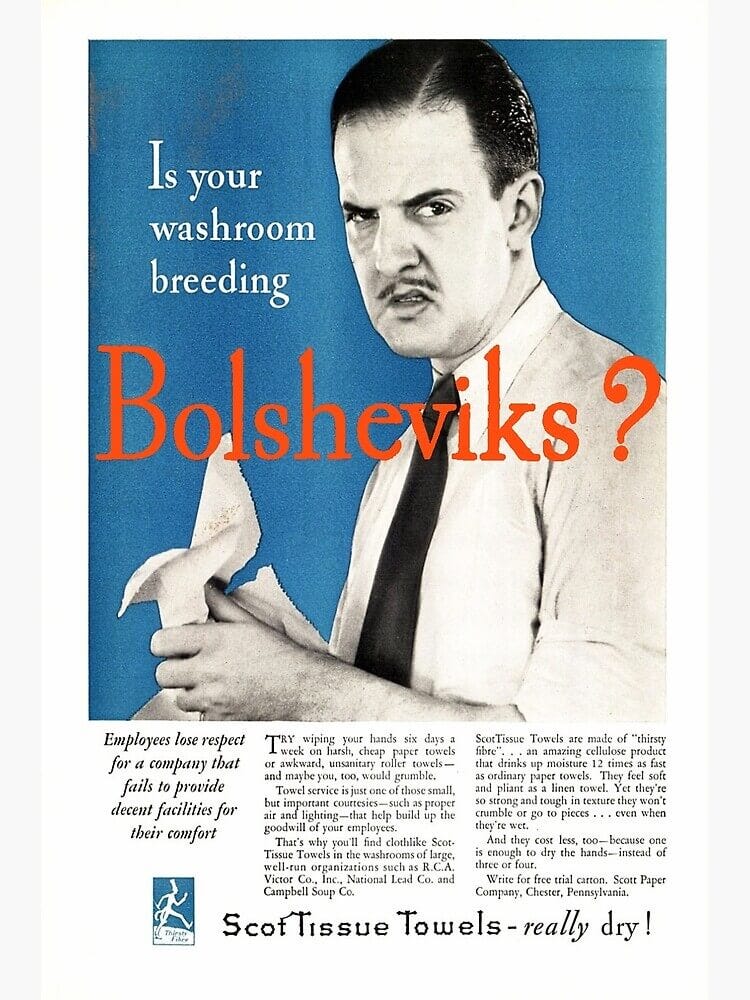I Think You'll Appreciate This Car Dealership Marketing Strategy
Also, paper towels make people Communist.
Hello Gobbledeers,
How’s it going?
Here’s how it’s going in swampy New York City:
Last week, one of my daughters had a friend visit NYC for the first time. We were walking around outside and she, very matter-of-factly, asked, “Is the pee I smell everywhere dog pee or human?”
The answer, of course, is “yes.”
Marketing, It Turns Out, Can Help Sell Cars
My wife has a friend who, for a whole bunch of years, ran her family’s car dealership. When she would come to visit us, she would sit down and say to me, “Great to see you, how’s everything going with you?”
And I would respond, “who the hell cares, I have 27,000 questions about your car dealership.”
And then I would pepper her with questions about car dealers.
(Why won’t they just sell you the car? What’s with all the bullshit? Are they better off not knocking another $300 off the car and trying to sell it tomorrow, or should they just knock $300 off the car today where they’ve got a guaranteed sale? Why are car dealers always saying they make almost nothing when they sell a car? If that’s true, why are they in the car dealership business? And also if that’s true, how does every car dealer in the South have enough money to either (until last year) illegally play football players to play for their alma mater, or (since last year) give them new trucks so they’ll play for their alma mater.). And so forth.
And what other business is there where both the buyers AND the sellers complain about the process to purchase the product.
And so forth forth.
Software marketers like to complain quite a bit* about their struggles selling software (the product doesn’t work like it’s supposed to; there’s nothing special about it; the salespeople don’t listen to us; the market is crowded; nobody loves me; my mother didn’t hug me enough; my kindergarten teacher said my handwriting was bad… some of those complaints might be specific to me…)
*(Understatement)
But car dealers certainly don’t have it easy. The Chevy Silverado that Bill’s Chevrolet sells is the same Chevy Silverado that Tom’s Chevrolet sells a couple of towns over, so the product isn’t differentiated. Maybe Chevrolet is making terrible cars while Buick is making great cars - the product is out of your hands, and you have to sell Chevys. You may be stuck with a bunch of garbage.
The marketing, itself, has changed a ton - sure, you can buy ads in the newspaper (newspaper! hahahahaha, I’m funny.) But also yes, you can place ads in the newspaper. Or you can buy ads on local TV. Or sponsor the Little League team, or join the Chamber of Commerce. It’s a local business (for the most part, though not entirely).
My point is that local car advertising is mostly this:
Except it doesn’t have to be!
I am incredibly impressed by what the fine social media team at Mohawk Chevrolet has been doing to promote their upstate New York dealership.
Let’s assume that people want to buy a car from a dealer they trust. Or “trust.” I’m not sure how people decide they “trust” a dealer. But I’d guess that you’d “trust” a dealer where you feel like you know the people who work there, and where those people seem genuine.
So the marketing team should be trying to find ways to make people feel like they trust the dealer because they know the people who work there.
The two people on the social media team at Mohawk have created a series of short videos (I think kids these days call them “Tiktoks”) that are (let’s say) Office-inspired, and try to create a personality for the dealership that, I’d guess, will engender trust among prospective buyers.
Here are 2 that I like:
And this one is about the cyber attack that affected a huge number of car dealerships, bringing all their systems to a halt over two weeks:
What amazes me the most is that the owners of the dealership actually trusted their social media team to create something that people would want to watch.
According to this article, the two of them write, shoot and edit each of these in a day, so there’s almost no budget to create them.
The woman who co-creates and stars in the videos is Grace Kerber - it’s her first job out of college, and this is what she told AdAge about making them:
Don’t plan too much, don’t overthink it. Most of what we make is not scripted, we are just going off an idea. I just blurt out things for 10 to 15 minutes for the opener lines. And no matter where you are, there are probably some big and funny personalities that you work with so just wing it and see what happens.
We are also lucky that we are allowed to have a fun side while still focusing on the cars and specials. Social media is part of our culture—people know when they join, especially sales folks, that we like to make videos. But they want to be in them so that locals and future customers know their faces and maybe come in and ask for them.
She alludes to something kinda brilliant - the salespeople WANT to be in the videos. The sales team WANTS to be involved in the marketing. We hear so often about a lack of alignment between sales and marketing, but so much good happens when marketing understands what sales wants (to be recognized when someone walks in the doors of the dealership) and the marketers are trusted to understand how to do that.
If you have 20somethings working in your office, unleash them! They know social media natively in a way that, for example, someone older than that does not. Tell them what you want a buyer to know about your product, and let them figure out how to tell that story. God bless the owners at Mohawk Chevrolet, but I’m going to guess that they would not say that they’re typically at the cutting edge of marketing strategy. But they’ve hired people who are and, gasp, let them actually do some marketing.
Bravo.
Research Corner
If you’re interested in the intersection of AI, messaging and politics, this study from a couple of researchers at Oxford found that using generative AI worked very well when it was used to create political persuasion messages, but that it showed no benefit when trying to microtarget those messages based on an individual’s characteristics.
This research was focused on political messaging, specifically, so it’s an open question how much it would apply in a non-political context. But given how much we hear about how generative AI tools can be used to scale up the number of versions of ads companies create, it remains an open question whether there’s any value at all in creating that many ads if you’re just hoping to microtarget.
(That’s the end of research corner.)
Communists Buy Paper Towels, Too
Whenever we talk about messaging, we talk about trying to focus on the real benefit that your product provides.
We recently bought a new refrigerator, and if you wanted to market that refrigerator you might say that it keeps food at a consistently cold temperature. But that’s not the real benefit - one real benefit is that food that stays at the right temperature can stay fresh longer, so you can save money by not throwing out old food.
Or you could take it a step further and say, “As a parent, don’t you want to provide fresh, homecooked meals for your family because cooking shows you love them, and being loved is really the only thing that matters in life?”
Or you could take it one step further and say, “If you only have melted ice cream in your freezer because it’s on the fritz, your son will go get ice cream at his friend’s house, and everyone knows the friend’s mom is working 3 jobs and doesn’t have time to supervise the friend, so the friend is always on the computer, and there’s no restrictions on how he uses it, so he’s definitely looking at porn and showing it to your son, who’s only over there because your ice cream is melted, and now your son has very unrealistic expectations of what he can expect from future sexual partners. You should’ve bought a Frigidaire.”
That approach, maybe, seems like it’s a step too far.
Except that’s exactly(ish) the approach that the Communist-hating folks at ScotTissue used when trying to sell commercial-grade paper towels to corporations in the 1930s or so:
“Employees lose respect for a company that fails to provide decent facilities for their comfort.”
So if your company thinks it can get away with buying cheap toilet paper and the like, just know that it doesn’t just mean your employees’ won’t feel fresh, clean and (as the ad says) “really dry!” It means they will lose respect for you, assume that capitalism has failed us all, and instead become Communists.
(I’ve definitely seen worse…)
(Thanks to Gobbledy reader Lindsey A. for passing that along.)
As always, thanks for reading to the end. I love hearing from readers. And non-readers. Here’s how to connect:
We can chat for 25 minutes about whatever you’d like. It’ll be fun, I promise. Here’s my Calendly link for that.
You can email me at jared@sagelett.com.
If you want to improve your company messaging, I do a 2-day workshop that has gotten rave reviews. You can read more about that at my website.






I would watch a full length sitcom of Mohawk Chevrolet. It's so good and I LOVE Grace.
That Bolshevism ad sure didn’t age well, but I think it’s a decent piece of marketing. It makes a strong argument (your employees hate you, our towels are higher quality AND less expensive than the competition). And it’s got an attention-grabbing image (shifty guy with pencil stache looking menacing and/or constipated). Maybe vilifying an entire nation and stoking fears of immigrants isn’t the best way to sell your paper products, but then again, Charmin has been using annoying, cartoon bears to hawk toilet paper for a generation. So, I don’t know.